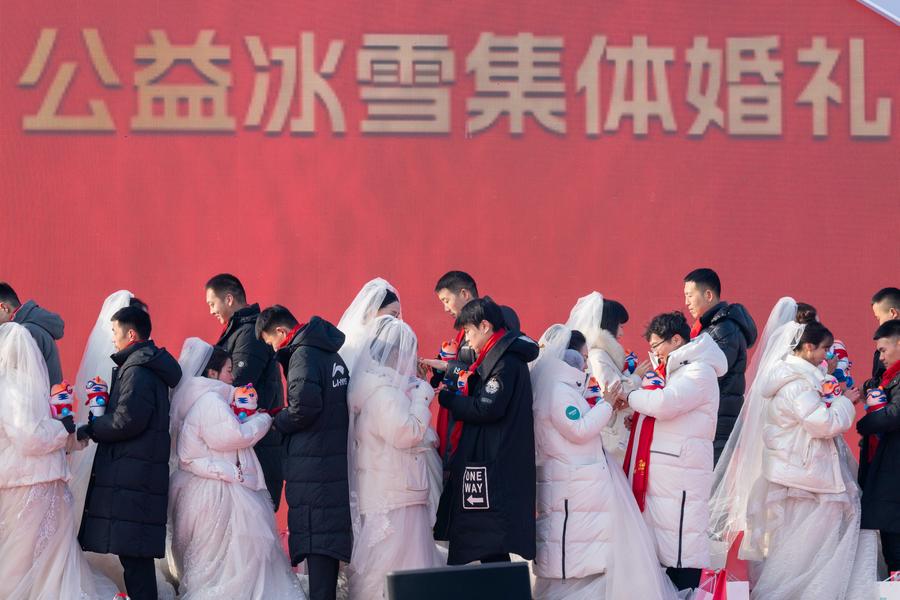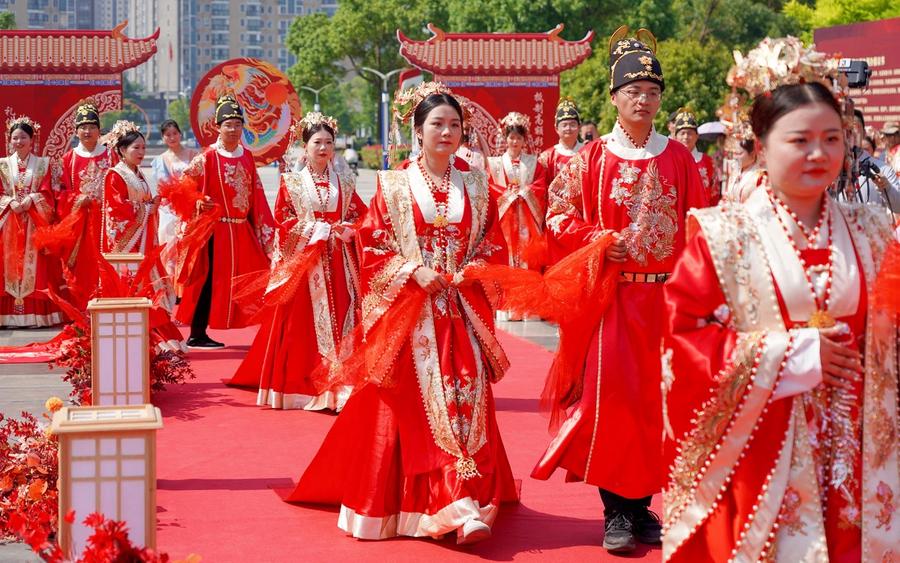
BEIJING - In Beijing's historic Qianmen district, a marriage registration office opened Saturday in the bustling Dashilan shopping area, amid a cluster of photo studios and shops offering wedding-related services.
On the same day, a revised version of marriage registration rules started to take effect in China, historically leaving out the former requirement of both loved ones showing their "hukou", or the certificate of household registration status, which had been in place since the 1980s.
Foreseeing that the policy revision – mainly to make marriage registrations and related services more convenient – would bring a surging number of registrants, the civil affairs authority set up the new registry to better serve couples.
"Previously, the newlyweds needed to go to places of their household registration and take the hukou booklets for marriage registration. From now on, loved ones just show their ID cards to tie the knot at marriage registration offices anywhere in the country," said Bian Zhihui, a registrar at the new office in downtown Beijing.
From checking ID cards and photos of the newlyweds, guiding them to fill out the forms, to verifying the information through a national computer network, the whole registration process takes only about ten minutes.
Bian said the new rule is among a slew of pro-marriage and childbearing policies promulgated by the Chinese government to streamline procedures and give incentives.
READ MORE: China eases marriage registration with new rules
China recorded 1.81 million marriage registrations in the first quarter of this year, marking an 8 percent drop from the same period in 2024, according to data from the Ministry of Civil Affairs.
After nine consecutive years of decline, China's marriage registration numbers saw a brief rebound in 2023. However, the downward trend resumed in 2024, with registrations falling to their lowest level since 1980.
The new marriage registration office is in a traditional courtyard building and boasts a one-stop service, allowing couples to choose wedding dresses and suits, take wedding photos, or purchase dazzling marriage souvenirs.
A 15-minute walk from the office is the marriage registration service center of the Civil Affairs Bureau of Beijing's Xicheng district, which has registered more marriages than anywhere else in the megacity with a population of nearly 22 million.
Xu Zongyi said the center, of which he is a deputy director, recorded nearly 20,000 marriage registrations in the year 2024.
The center expected the new rule to bring about a surge of 20 to 30 percent in marriage registration. The new branch registry with better wedding-themed rejoicing atmosphere can help deal with the increase and improve the service, said Xu.
READ MORE: Fewer Chinese young people tying the knot as perceptions of marriage change
On Saturday, there were approximately 1,700 pairs of marriage registrations recorded in Beijing, among which about 900 pairs are not permanent residents of Beijing.
A number of Chinese provinces and cities have done more than reducing red tapes to boost marriage and fertility rates.
In March this year, the provincial government of Zhejiang issued a notice calling on local authorities to improve marriage and fertility support policies, with recommended incentives including the distribution of cash in the form of "wedding red envelopes" or consumption vouchers to the newlyweds.
Yan Yan from the Civil Affairs Bureau of Shenyang, capital of Northeast China's Liaoning province, told Xinhua that a government-sponsored group wedding for 52 couples is slated for May 22, with the ceremony to be held in the historic Shenyang Palace Museum.

"Through the group wedding, we advocate new ways of weddings infusing traditional customs with new trend of thrifty practice," Yan said.
Liu Qing and Yao Wenjiu, both working in Shenyang and being away from their home cities, plan to get married this month.
"The new rule allows us to do it more conveniently in the city where we work – you don't have to go back home to 'steal' hukou booklets from parents," Liu said with a tone of mockery.
ALSO READ: Marriages in China down in Q1 amid demographic, perception changes
While marriage is legally determined and executed autonomously by the parties involved, parental approval and endorsement remain culturally paramount in Chinese marital traditions. For young adults whose household registration remains jointly registered with their parents – even if they live and work elsewhere – previous regulations required them to obtain the family's hukou booklet to complete marriage registration. This effectively meant that registering a marriage first necessitated parental awareness and consent.
Wang Jun, a marriage and family counselor, said marriage registration reform eliminates the mandatory household registration booklet requirement, granting individuals full autonomy in marital decisions.
Working as a counselor for more than ten years, Wang volunteers as a counselor at the Xicheng district marriage registration service center.
"Parents' opinions are traditionally deemed authoritative to help their children choose 'right' spouses and avoid risks in future marriage. Nowadays, many young people are more inclined to seek help through counseling," Wang said.
However, she warned that under the rule, there might be higher possibility of impulsive "flash marriage" and divorce, especially among young people who lack the experience dealing with intimate relationships and family issues.
ALSO READ: China to lift hukou-based marriage registration curbs nationwide
China's marriage registration offices are recruiting many volunteers like Wang for counseling marriage and divorce issues. Online search giant Baidu has made MFC – the English abbreviation of "marriage family counselor" – a search hashtag after MFC was listed among the country's new professions.
Liu said even without the requirement of hukou booklets, they respect their parents' opinions, and discussed every detail of the wedding with their parents.
"It doesn't matter about the policies. The parents have the right to be informed," she said.


